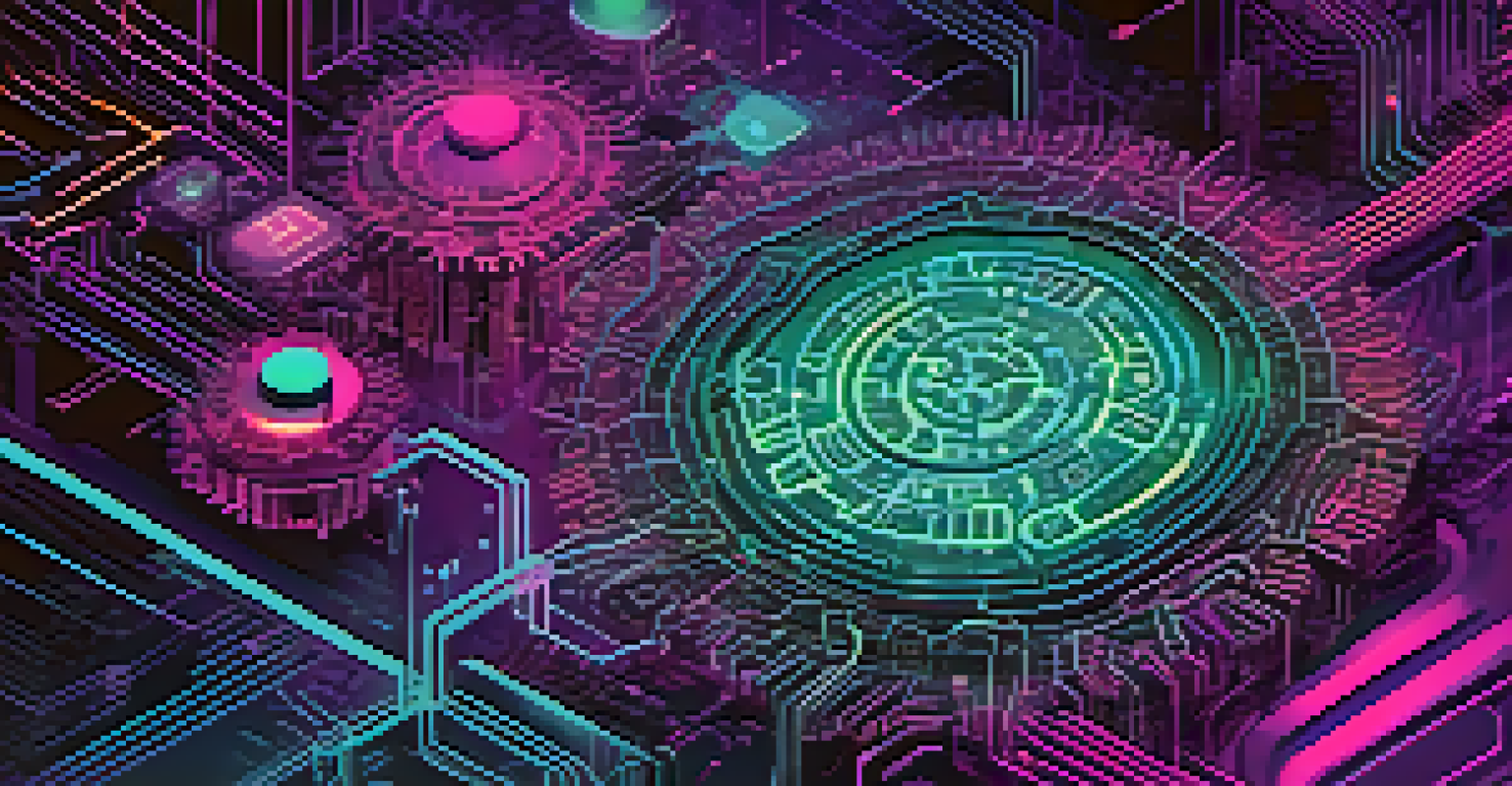Decentralized Autonomous Organizations: AI's Contribution

Understanding Decentralized Autonomous Organizations (DAOs)
Decentralized Autonomous Organizations, or DAOs, are essentially organizations run by smart contracts on a blockchain. They enable collective decision-making without centralized control, allowing members to vote on key issues. This structure fosters transparency and trust, making it attractive for various communities and projects. Imagine a digital co-op where every member has a say, and decisions are made automatically based on agreed-upon rules.
The future of organizations is not about control, but about trust and collaboration.
The rise of DAOs has been fueled by the increasing demand for transparency and inclusivity in decision-making. Traditional organizations often struggle with bureaucratic slowdowns, but DAOs can facilitate quicker responses to changes. They encourage diverse participation, as anyone with an internet connection can join and contribute. Thus, DAOs represent a shift towards more democratic and engaging forms of governance.
As DAOs continue to gain traction, the integration of artificial intelligence (AI) into these frameworks becomes an exciting possibility. AI can help streamline operations, enhance decision-making processes, and improve member engagement. By harnessing the power of AI, DAOs can potentially overcome some of their inherent challenges, paving the way for more efficient and effective organizations.
The Role of AI in Enhancing Decision-Making
AI's ability to analyze vast amounts of data quickly makes it an invaluable asset for DAOs. With AI, organizations can process member feedback, voting patterns, and external trends in real-time, leading to more informed decisions. This data-driven approach can help mitigate biases that might arise in human-led decision-making processes. Essentially, AI can act as an impartial advisor, offering insights that may not be immediately visible to human members.

Furthermore, AI can assist in predicting outcomes based on historical data, allowing DAOs to forecast the impact of various proposals. For instance, if a DAO is considering a new funding initiative, AI can analyze previous funding outcomes to determine potential success rates. This predictive capability enhances strategic planning and ensures that decisions are made with a clearer understanding of possible consequences.
DAOs Promote Transparent Governance
Decentralized Autonomous Organizations empower members to make collective decisions transparently, enhancing trust and inclusivity.
Integrating AI into DAOs can also help streamline administrative tasks, such as managing proposals and voting systems. By automating these processes, organizations can focus more on strategic initiatives rather than getting bogged down in logistics. In this way, AI not only enhances decision-making but also optimizes the overall operation of the DAO.
Smart Contracts: The Backbone of DAOs
At the heart of every DAO is a smart contract, which acts as a self-executing contract with the terms directly written into code. These contracts enable transparency and automation, eliminating the need for intermediaries and reducing the potential for fraud. Think of smart contracts as digital vending machines: once you input the right amount, the machine delivers your choice without any human interaction. This level of automation is crucial for the efficient functioning of DAOs.
Technology can create a new form of governance that is transparent, participatory, and responsive to the needs of all members.
Smart contracts also enhance the integrity of the voting process within DAOs. They ensure that votes are counted accurately and transparently, as the results are stored on the blockchain, accessible to all members. This transparency not only builds trust among members but also reduces the likelihood of disputes regarding outcomes. In a world where trust is paramount, smart contracts serve as a foundational element for confidence in decision-making.
By combining smart contracts with AI, DAOs can create more sophisticated frameworks that adapt in real-time to changing circumstances. For example, AI could adjust the parameters of a smart contract based on member feedback or external data, allowing for a more flexible governance model. This synergy between AI and smart contracts represents a significant evolution in how organizations can operate.
AI-Powered Analytics for Member Engagement
One of the challenges DAOs face is maintaining high levels of member engagement and participation. AI can play a pivotal role in analyzing member behavior and preferences, offering insights into what drives engagement. For instance, AI can identify which proposals attract the most interest or which communication strategies resonate best with members. This data helps organizations tailor their approaches to keep their communities active and involved.
Moreover, AI can facilitate personalized experiences for DAO members, enhancing their connection to the organization. By utilizing algorithms that suggest relevant proposals or initiatives based on past interactions, AI can help members feel more aligned with the DAO's goals. Imagine walking into a store that knows your preferences; that’s the kind of tailored experience AI can provide within DAOs, boosting member satisfaction.
AI Enhances DAO Decision-Making
Integrating AI into DAOs allows for data-driven insights and predictive capabilities, improving decision-making processes.
In addition, AI can automate routine communications, ensuring that members are informed about important updates and voting opportunities. By streamlining these processes, DAOs can maintain a consistent flow of information without overwhelming members. Ultimately, AI-driven analytics can help foster a vibrant community, ensuring that every voice is heard and valued.
Risk Management: AI's Contribution to Stability
Every organization faces risks, and DAOs are no exception. From market volatility to governance challenges, the landscape can be unpredictable. AI can significantly enhance risk management by providing real-time analysis and alerts, helping DAOs navigate potential pitfalls. For example, if a particular proposal poses a financial risk, AI can flag it for further scrutiny before members vote.
Additionally, AI can assess the overall health of the DAO by analyzing various metrics, such as member engagement, proposal success rates, and financial performance. This holistic view allows organizations to identify weaknesses and address them proactively. By understanding the factors that contribute to stability, DAOs can make informed decisions that promote long-term success.
Moreover, AI can support scenario modeling, enabling DAOs to simulate the impact of different decisions before implementing them. This capability allows organizations to explore potential outcomes and select the best course of action. In essence, AI acts as a safety net, helping DAOs mitigate risks while pursuing their objectives.
Challenges Faced by AI in DAOs
While the potential benefits of integrating AI into DAOs are promising, several challenges must be addressed. One significant hurdle is ensuring data privacy and security, as AI requires access to vast amounts of information. DAOs must implement robust protocols to safeguard member data while allowing AI to function effectively. Striking the right balance between transparency and privacy is crucial for maintaining trust within the community.
Another challenge lies in the complexity of AI algorithms, which can sometimes be opaque and difficult for members to understand. If members feel disconnected from the technology driving decisions, it may lead to skepticism and disengagement. To combat this, DAOs should prioritize clear communication about how AI works and its role in decision-making processes. Educating members can help bridge the gap between technology and community involvement.
Smart Contracts Ensure Integrity
Smart contracts serve as the backbone of DAOs, providing transparency and automation that strengthen the voting process.
Lastly, the rapid pace of AI development means that DAOs must stay updated with the latest advancements. As AI technology evolves, organizations need to continuously adapt their systems and processes to leverage new tools effectively. This commitment to innovation is vital for ensuring that DAOs remain competitive and relevant in an ever-changing landscape.
The Future of DAOs with AI Integration
Looking ahead, the integration of AI into DAOs holds immense potential for transforming organizational dynamics. As AI continues to advance, it can enhance the capabilities of DAOs, making them more efficient, responsive, and inclusive. This evolution could lead to a new era of governance where decisions are made swiftly and based on data-driven insights. Imagine a world where organizations can adapt almost instantaneously to the needs and preferences of their members.
Moreover, as more DAOs adopt AI, we may see the emergence of hybrid models that combine human intuition with machine intelligence. This blend can create a more nuanced approach to decision-making, where AI provides recommendations while humans retain the final say. Such models could empower members to leverage AI's capabilities while ensuring that the human touch remains integral to governance.

Ultimately, the future of DAOs enriched by AI promises to foster communities that are not only more engaged but also more capable of tackling complex challenges. By embracing this technology, DAOs can unlock new opportunities for collaboration and innovation, setting the stage for a more decentralized and democratic future.